So, you know how at the start of The Lion, the Witch and the Wardrobe, a family of British kids are sent into the country to stay with an old recluse, which ultimately leads them to all sorts of magic shenanigans? Imagine that same story, but this time, instead of Jadis being the villain, she’s the aforementioned recluse and the hero—and she fights Nazis.
That’s Bedknobs and Broomsticks.
There’s a lot to be said about timing when it comes to the media you consume as a child. For me, Bedknobs arrived well before I ever got my hands on copies of C.S. Lewis’s beloved books, but it also far surpassed the Mary Poppins movie, which I just didn’t adore as much as other kids; there was something disconcerting in how perfect Mary was that, for me, ruined the whole gambit. In Bedknobs and Broomsticks, all of the characters in it are certifiable trash, including the children. That is what makes the movie good.
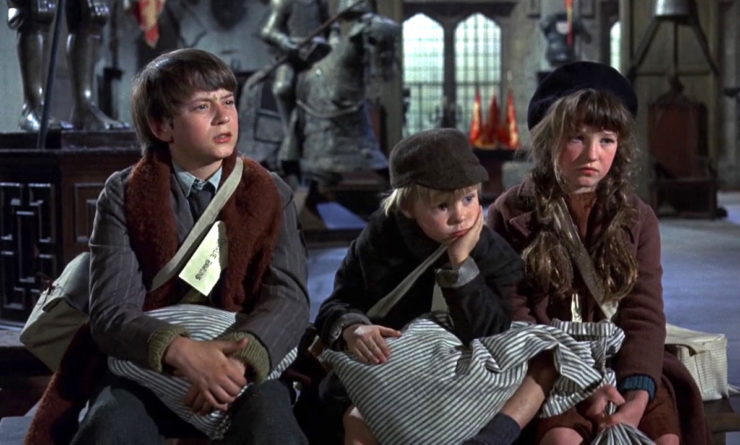
If that sounds harsh to you, I should say that I’m using the term “trash” accurately, but with love. The Rawlins kids—Charles, Carrie, and Paul from oldest to youngest—are not interested in presenting a unified front in the face of uncertainty, the way the Penvensies do. Delivered out of London Blitz and into a small coastal village called Pepperinge Eye (of the many outrageous names in this movie, the town is but our first example), the Rawlins trio are put into the care of one Ms Price, an unmarried middle-aged eccentric who drives around on a motorbike-avec-sidecar that seems to pour gaseous sulfur from its tailpipe. Ms Price doesn’t really enjoy children, to put it mildly, and is rather focused on other things.
Those other things, I should probably mention, are learning witchcraft via a mail-in correspondence course for the purpose of aiding the war effort against the Nazis.
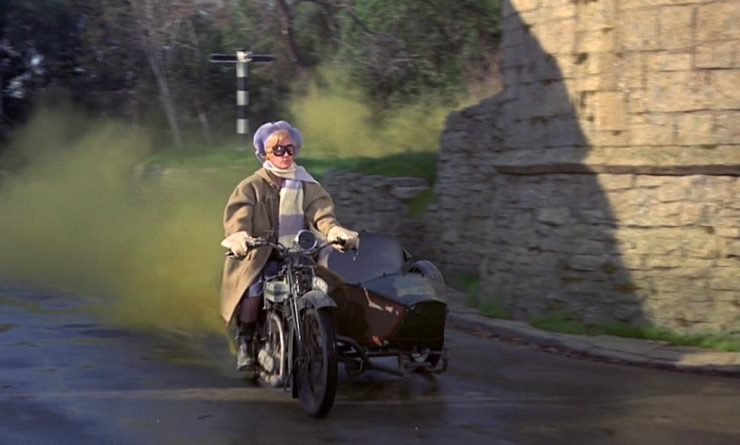
Ms Price is played with imperious unflappability by Angela Lansbury, and she feeds these growing youngsters unappetizing witchy meals like stewed nettles, and lets them fear her hissing black cat (who goes by the name Cosmic Creepers because I told you this was the gift that would keep giving), and tries to get on with her life as though she isn’t now responsible for three whole children. Which might explain why she tries her very first broom flight while they’re sleeping under her roof, and crashes spectacularly when she tests out the “no hands” method. The kids decide to blackmail her with their knowledge of her occult activities, and she responds the way any responsible adult would—by offering them some cool magic if they promise not to talk.
The cool magic in question turns out to be a transportation spell that she puts on a bedknob that Paul pocketed from their bedroom. Once returned to the bed frame, Paul only has to tap the knob three times and turn it a quarter to the left to take them anywhere in the world. It is unclear what Ms Price thinks these kids will use the spell for without her supervision, and it gets more woolly when we realize that Paul is the only one who can work the spell because he stole the bedknob, and Ms Price apparently operates firmly under the “finders keepers” law of theft. He’s also six years old, so he’s clearly the one you want in charge of extremely powerful magicks.
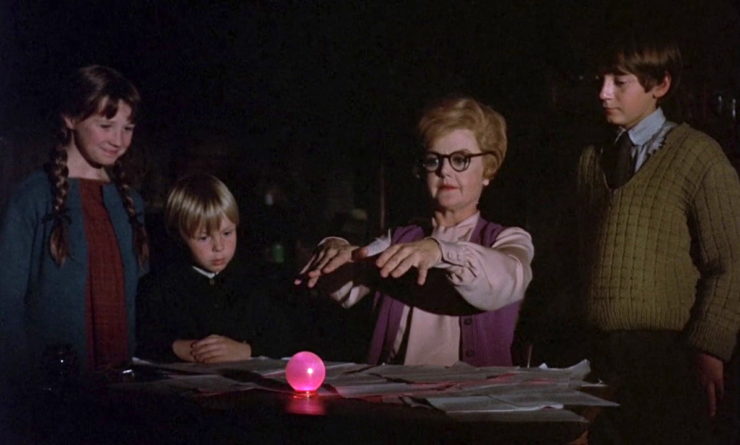
But before we can find out how Paul might put this to use on his own, the plot helpfully twists for us—Ms Price’s witchcraft correspondence course is cut short, right before receiving the final spell on Substitutiary Locomotion, which she was dead set upon. (It makes inanimate objects move and do your bidding, you see.) She asks the children if they can all use the transportation spell together, and they hop onto the bed, and head to London to meet the man responsible for the course, Professor Emilius Browne. Sadly, the man turns out to be a cheap con artist (played by David Tomlinson, aka Mr. Banks) who has no magical ability whatsoever. The courses he sent came from a book he found that was missing its back half, hence the incomplete spell.
This is a good time to mention that Ms Price’s first name is Eglantine.
Why is it a good time to mention it? Because Professor Browne’s response to meeting Ms Price and her ability to do real magic (she turns him into a rabbit when he irritates her, it’s beautiful) is to sing a song about how she should be the assistant for his magic act. The song is named after her because he literally follows her around the library of a mansion he’s squatting in—it’s the Blitz dontcha know—telling her his plans for their show business future, and repeatedly singing the words “I’m your man” and “Eglantine, Eglantine, oh how you’ll shine!”
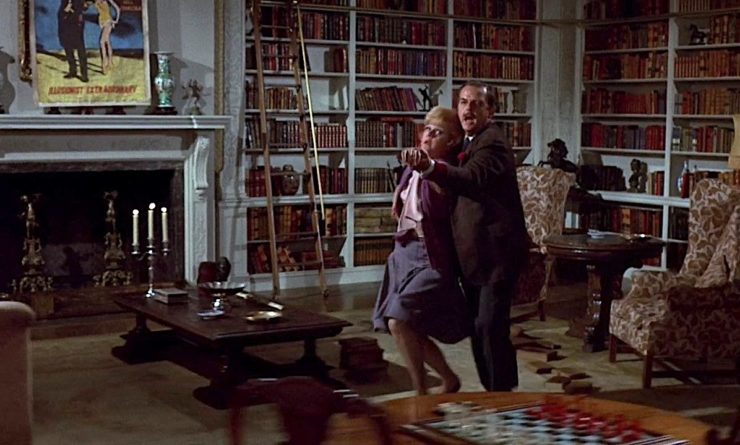
I did say that everyone in this movie was trash. I meant it.
Ms Price has no interest in being a befeathered magician’s assistant who gets no credit for her actual magical skill, and insists on finding the other half of the book to get her hands on that spell. This leads the whole gang to check out Portobello Road—which Professor Browne also sings a song about, and if that song doesn’t make you want to go to Portobello Road and shop for antiques, then I feel bad for you because it definitely knocked something lose in my five-year-old brain, and it wasn’t satisfied until I actually went to Portobello Road as an adult. (My partner got a beautiful old copy of Howard Pyle’s Robin Hood, so it was a win-win all around.) This segment leads to a worldwide music-and-dance-off with steelpans, bagpipes, flutes, and various groups of dancers joining hands and spinning about. There is no reason for this to be in the movie at all, you just need to go with it and be glad that you’re not getting treated to a Rogers and Hammerstein-esque dream ballet instead.
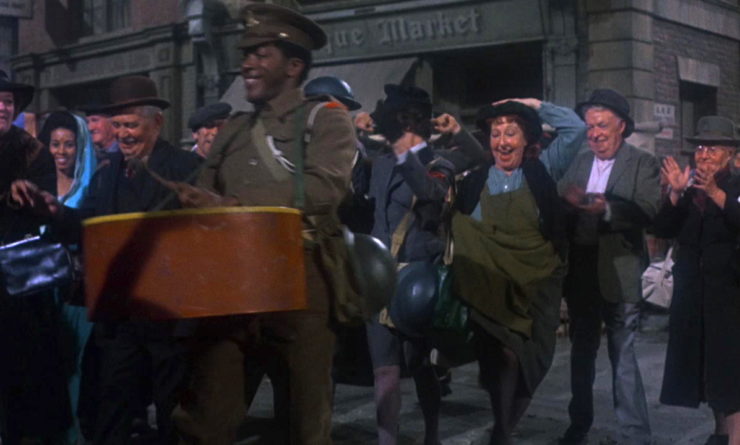
Somehow, this leads to the whole group getting kidnapped at knifepoint by a henchman to some dude who is known only as “The Bookman” (again, what are names)? He has the back half of the book Ms Price is looking for, but when they swap, they learn that the spell for Substitutiary Locomotion can only be found inscribed on the Star of Astoroth, and that said star is likely located on the island of Naboombu, where dwell a bunch of animals that the late sorcerer Astoroth cast an anthropomorphism spell upon. Because it’s Disney, and they’ll be damned if they’re not gonna repurpose a bunch of animation they’ve got lying around to get their money’s worth.
They use the bed to get to Naboombu, enter an underwater dance competition (weirdly, you could argue that the real plot of this movie is Eglantine Price discovering how much she actually enjoys dancing) and win, then watch as Professor Browne gets trampled as the ref in a soccer game for King Leonidas, the lion wearing the the very medallion they seek. Using his conman skill, Professor Browne gets the medallion, and they all hurry back to the 3D world as an angry lion king rushes them.

The Star of Astoroth vanishes in the real world, but Paul has the answer—the spell was actually printed in the children’s book he’d been reading about Naboombu this whole time. (So the diversion to Naboombu is literally pointless, and the plot makes the point of telling us that.) Ms Price tries the spell and it works… a little too well, bringing Professor Browne’s shoes and various other household items to life. Unfortunately, true to Ms Price’s particular way with magic, she cannot completely control the outcome, and decides that perhaps this won’t work out as well as she planned. Professor Browne makes them all an excellent non-witchy dinner, at which point everyone seems to realize that this ragtag group has become a family, but the real world predictably intrudes. A woman from town drops by to tell Ms Price that they’ve found another suitable home for the children, so she doesn’t have to keep them. Then Professor Browne, sensing the specter of commitment in his future, makes for the train station.
Obviously, this is when the Nazis choose to invade this quaint little seaside hamlet.
Professor Browne is laying out on a bench, waiting for the train and imagining Ms Price dressed in a very sultry magician’s assistant getup (again, trash) when he realizes that there are Nazis about, and he’s made a terrible mistake. He finds the crew being held in the local museum—they’re using Ms Price’s house as a base of operations for their little invasion—and the reunion prompts another go at the Substitutiary Locomotion spell. But this time, she’s in a museum… which means that all the inanimate ephemera she was to work with come in the form of medieval armor and weapons. Thus fortified, Ms Price attacks the Nazi incursion with an army of phantom knights and foot soldiers.
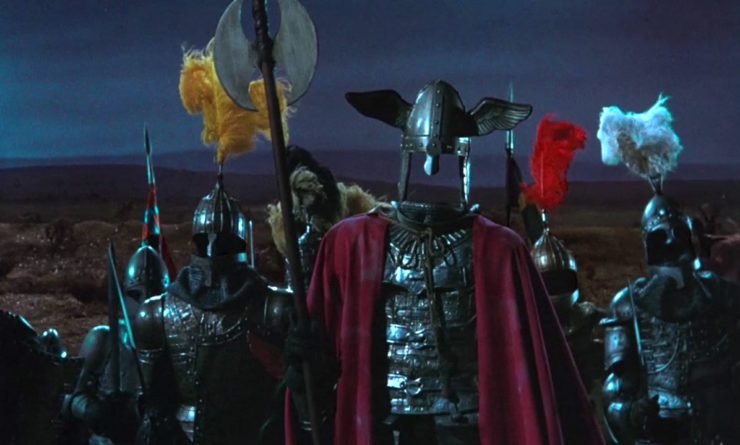
And she wins.
Of course, the town’s Home Guard—these guys amply contribute to Pepperinge Eye’s “character”, frequently marching through the streets in their old uniforms, singing their song of former glories—believe they deserve credit for the defeat because they show up right at the end with their rifles. But what else is new? Also, the Nazis destroy Ms Price’s little witchery basement before they escape, effectively ending her career in magic. (Sure… let’s all say we believe that.) She and Professor Browne get married, adopt the kids, and then he enlists in the army to go off and fight in World War II, which is mostly perplexing for the fact that we never get to hear any reasoning about it whatsoever. The end of the movie is a fairly inexplicable afterthought, meant to give people the comfortable nuclear family ending they probably expected in 1971, but who cares? This found trash family saved England!
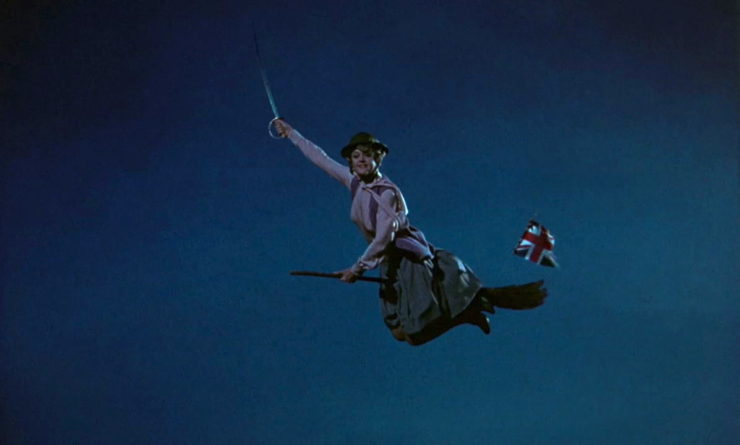
As a child, the very existence of Eglantine Price was an anomaly of epic standing to me. The idea of a woman over the age of forty saving her neighbors from tyranny as the world’s clumsiest witch was a delight that I found myself returning to over and over. She was permitted to be so many things I rarely saw in women on film: reckless, particular, awkward with kids (but not because she didn’t understand them), protective of her own time and activities and space, adventurous in a very no-nonsense way. She wasn’t always pleasant, but she didn’t have to be. And she was still the hero.
Sometimes you can be a right mess, and still make a real difference. That’s what Bedknobs and Broomsticks taught me when I was small. And if you’ve never had the pleasure, I can’t recommend it enough.
Originally published April 2020.
Emmet Asher-Perrin wants you to know that the movie is on Disney+ if you’ve got it. You can bug them on Twitter, and read more of their work here and elsewhere.










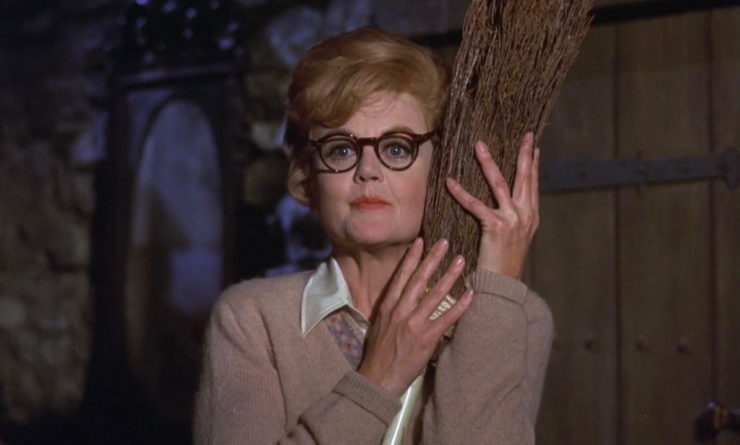
This is one of my favorite movies from my childhood and I recently rewatched it with a dear friend who had never seen it. I didn’t realize they married at the end and adopted the kids, but the rest of your review is totally spot on.
It’s always a good time to learn witchcraft and dispense with Nazis.
There’s perfect reasoning for Professor Browne enlisting – he was within the age range and not in a protected occupation. He should have joined up before the film even starts; he was skipping out on his duty. Joining up is him accepting his responsibilities. Even if he hadn’t intended to join up, in order to marry Eglentine he’d have had to get a marriage licence, which would have told the authorities where he was and thus enabled them to call him up.
What doesn’t make sense is why the kids were evacuated to the coast and then stay there; though some children from London were originally evacuated to the south coast when war broke out, they were very quickly relocated inland (and the south coast kids were sent with them) once the authorities realised they were well within range of German fighter-bombers and would be on the receiving end of any invasion attempts.
I too loved this movie as a child. The dvd is worth it for the extended street dance scene and a cut song for Miss Price from Angela Lansbury’s audition. It’s sort of a motivation/I want song.
A wonderful film that teaches children, among many important lessons about entrepreneurialism, investing in rural infrastructure, strong female role models, historical preservation, and civic engagement, is that you should always punch Nazis. In cases where there are more Nazis than you can possibly punch, you should raise an army of the dead to do it for you.
Movie is absolutely one of my favorites! Love the mix of animation and live action as a kid (and adult). Angela Lansbury was amazing, and the battle at the end was fantastic!!
Treguna Mekoides Trecorum Satis Dee!
I haven’t seen that movie in 25 years or so and I can STILL remember the magic words of the substitutiary locomotion spell.
I love this film! THANK YOU for such a brilliant review! The song, “The Age of Not Believing,” stayed with me for my whole life. I was frightened to death of growing up so much that i didn’t believe in the possibility of magic or miracle. The way Eglantine sings this to the kids, specifically the eldest, to shame him, a bit, but also to make him wish he still believed is powerful. (It feels very Jungian—and his “living a symbolic life”). I saw this as a child and I think it imprinted on me the joy of Portal fantasies and children who jump through, flawed but helpful adults, anthropomorphic animals, suits of armor that fight to protect you like robots, and always being open to the belief that magic is possible. I think these tropes are my favorites. I sang all the songs, and I now want to scan DISNEY PLUS to see if I can see this movie again! THANKS!!
Ms. Asher-Perrin, I heartily endorse your fondness for this old classic but one can only call your conflation of Miss Price with Jadis of Charn (even in jest!) as the most horrible act of libel one can imagine; I would respectfully suggest Professor Kirke (or perhaps Mrs Macready) as a more apposite comparison.
After all Miss Price is a witch, but not a monster – Jadis of Charn is most certifiably both and a selfishly arrogant aristocrat to boot.
Ahem, please read the line above as “… can only call out against your conflation of …” (sheer indignation having rather ruined any pretensions to elegance in that sentence).
Somehow, this leads to the whole group getting kidnapped at knifepoint by a henchman to some dude who is known only as “The Bookman”
Said henchman is played by Bruce Forsyth, who had one of the longest-running careers in television anywhere in the world. He regularly appeared on British TV in one capacity or another (often as some sort of game show host) from 1939 right up to 2015. 76 years of Bruce Forsyth: truly the stuff of nightmares.
Bibbity Bobbity, Bobbity Bibbity , Bippity Bobity Bo :)
you have no idea how many years that has been going though my brain and comes up just about every time I see someone trying to do magic on the TV, much to anyone else’s confusion.
I saw this movie four times as a kid, because my parents were addicted to ‘The Godfather’ and B&B was playing in the next theatre. Love, love, love! The Portabello Road number. Could have lived without the cartoon interlude, but the final battle with the animated armour and uniforms still gives me chills and patriotic tears – and I’m not even British!
I first saw this film on a wet Wednesday afternoon on holiday in the Isle of Man – there was nothing else to do but go to the cinema.
I saw it again this week, and it really is a delight – but not a bit like the original Mary Norton book (she also wrote The Borrowers) in which I seem to remember the bed time travelling, as they save an unfortunate warlock who was about to be burned at the stake!
To be honest, I would not expect a character in a children’s story set in the 1940s to be called Ms anything.
One of my favorite movies of all time! I used to play the medieval tapestry-style opening sequence over and over again.
@14: I believe in this case she specifically was (at least in the original book; I can’t recall if this detail was explicitly carried over to the film).
@16 Using the look inside feature on amazon, the kindle edition of the novel appears to call her “Miss Price”, as does IMDB, Wikipedia and the Disney.Fandom website. On the whole, I feel this suggests that someone’s memory has misled them.
The scene with Ms. Price (Angela Lansbury) trying out riding a broomstick for the first time is worth the price of admission all by itself. That is some excellent physical comedy right there.